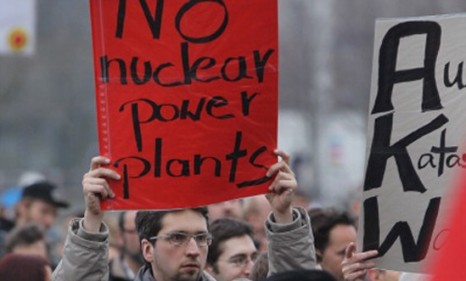Japan's crisis: The world rethinks nuclear power
After a catastrophic earthquake and tsunami, Japan grapples with a nuclear nightmare that has other countries questioning the risks of nuclear energy

A free daily email with the biggest news stories of the day – and the best features from TheWeek.com
You are now subscribed
Your newsletter sign-up was successful
Japan's battle to stave off a total nuclear meltdown continues. The Fukushima Daiichi crisis has been elevated to a 6 on the 7-point scale of nuclear disasters — with Chernobyl the only 7 to date — but it's already having a cooling effect on the global nuclear power industry. Roughly 240 nuclear reactors are slated for construction around the world by 2030 at a projected cost of up to $1 trillion. But will they even be built after Japan's disaster? Here's how five of the biggest players are reacting to Japan's nuclear nightmare:
1. America stands by nuclear power
President Obama, who has proposed billions to help revive America's nuclear power industry, said Tuesday that nuclear power should remain an important part of America's energy mix, despite Japan's calamity. The U.S. gets about 20 percent of its electricity from nuclear power, but no new plants have been completed since the 1979 Three Mile Island disaster. Energy Secretary Steven Chu said it is "probably premature" to say how Japan will affect the four nuclear plants closest to approval. Opinion in the Senate is mixed.
The Week
Escape your echo chamber. Get the facts behind the news, plus analysis from multiple perspectives.

Sign up for The Week's Free Newsletters
From our morning news briefing to a weekly Good News Newsletter, get the best of The Week delivered directly to your inbox.
From our morning news briefing to a weekly Good News Newsletter, get the best of The Week delivered directly to your inbox.
2. Europe commits to stress tests
The European Union, which embraces both nuclear-power enthusiasts in France and deep skeptics in Germany, has committed to subjecting the region's nuclear reactors to "stress tests" this year. Nuclear power provides about a third of the electricity for the EU's 27 nations. And other than Germany (see below), Europe isn't cutting back: France is committed to its 58 reactors, Britain is extending the life of one plant and building four more this decade, and Italy is going ahead with its first nuclear reactor.
3. China continues full speed ahead
The Chinese government says Japan's disaster won't stall China's big push for nuclear power. China currently gets only 1 percent of its electricity from its 13 nuclear reactors, but it has 25 more under construction, and at least 45 other proposed reactors approved by regulators. China, like Japan, is prone to deadly earthquakes, but Chinese officials say all their plants will be on solid bedrock, away from fault lines. "There is a higher standard in China than the world's average," insists Xu Mi, an official at China National Nuclear Corp.
A free daily email with the biggest news stories of the day – and the best features from TheWeek.com
4. India promises safety reviews
Indian Prime Minister Manmohan Singh took a big political risk by betting heavily on a $175 billion plan to double India's nuclear power capacity. Singh told parliament on Tuesday that government inspectors will review the safety at India's 20 active nuclear reactors, including the two with the same design as Japan's failing plants, and enact more stringent controls on any future plants. But with India's booming economy running into regular blackouts, and 500 million Indians still without electricity, Japan's disaster is not expected to slow India's nuclear drive.
5. Germany calls it quits
Chancellor Angela Merkel said Tuesday that Germany will at least temporarily shut down all seven of its nuclear reactors built before 1980, leaving the other 10 online. Merkel's government angered some Germans last year by reversing a previous plan to shut down all of Germany's nuclear power plants. This about-face "has much to do with politics," and little to do with safety, says Brooke Unger in The Economist. Three German states have big elections this month and 53 percent of Germany's already nuclear-"hypersensitive" population is in favor of shuttering all nuclear plants. So Merkel's pro-nuclear coalition could lose big.
-
 Political cartoons for February 16
Political cartoons for February 16Cartoons Monday’s political cartoons include President's Day, a valentine from the Epstein files, and more
-
 Regent Hong Kong: a tranquil haven with a prime waterfront spot
Regent Hong Kong: a tranquil haven with a prime waterfront spotThe Week Recommends The trendy hotel recently underwent an extensive two-year revamp
-
 The problem with diagnosing profound autism
The problem with diagnosing profound autismThe Explainer Experts are reconsidering the idea of autism as a spectrum, which could impact diagnoses and policy making for the condition